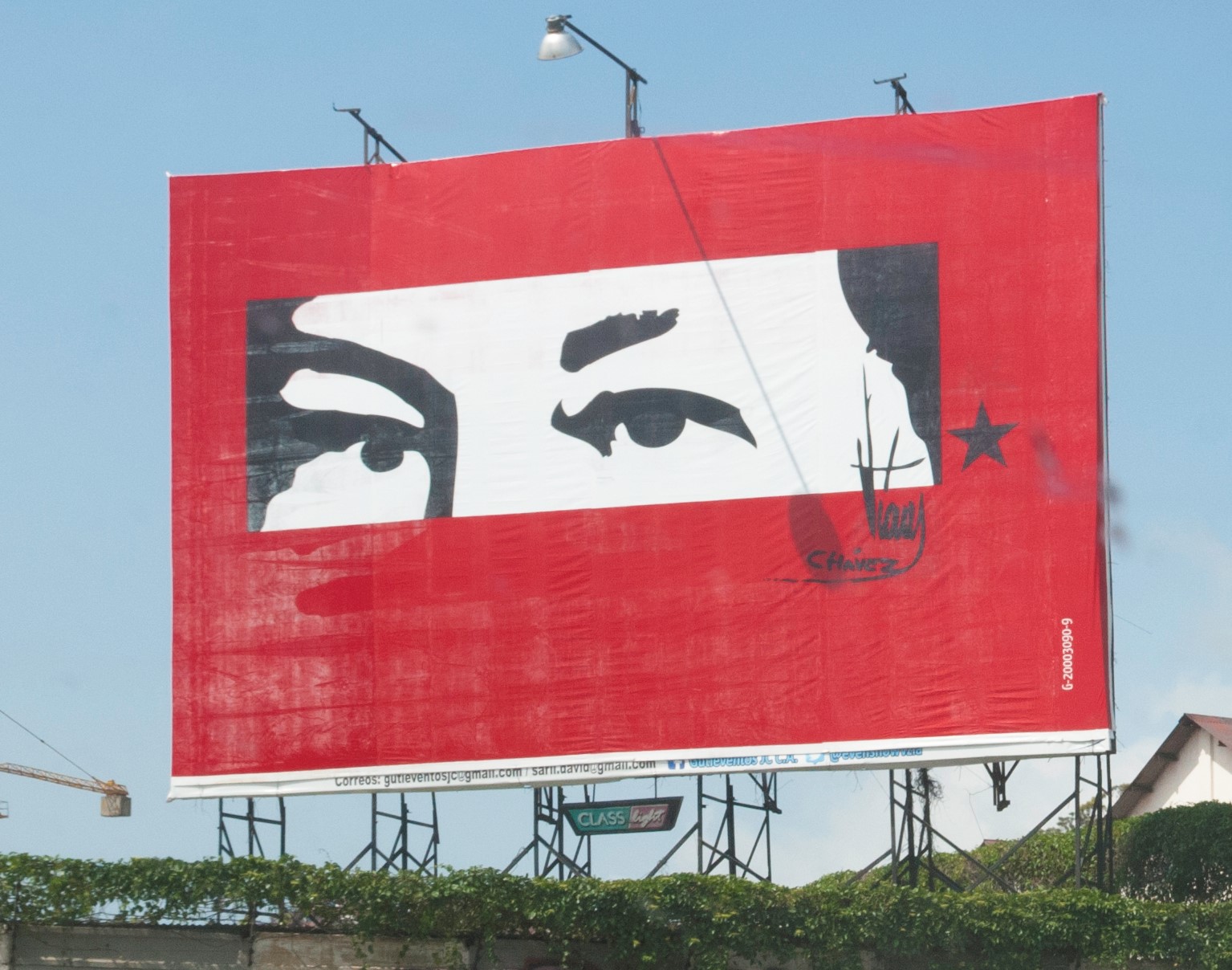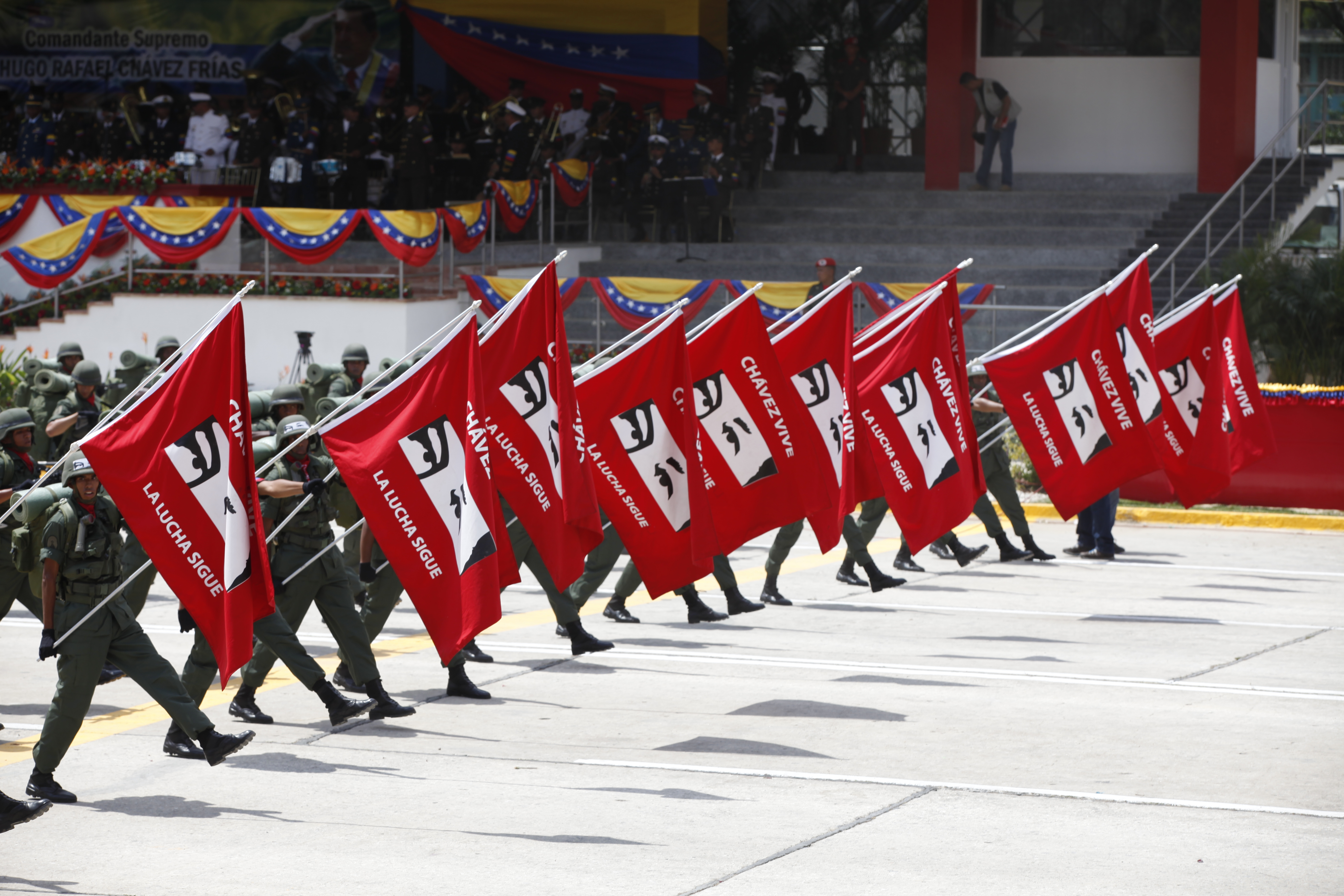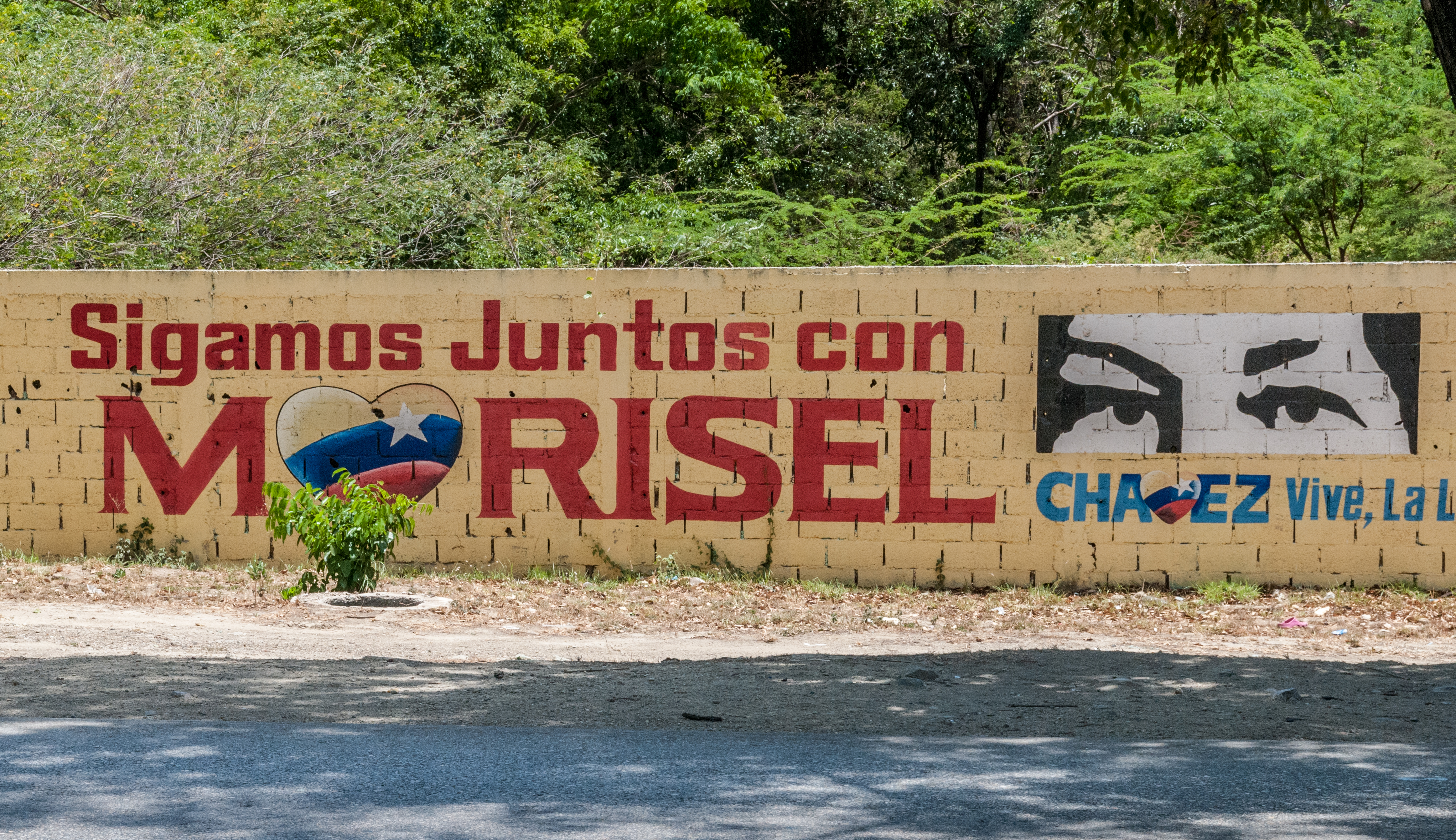Chávez eyes on:
[Wikipedia]
[Google]
[Amazon]
 "Chávez eyes" (
"Chávez eyes" ( "Chávez eyes" first originated from Hugo Chávez's final presidential campaign in 2012, with the idea originating from José Miguel España, a member of Chávez's campaign. During an election gathering, thousands of Chávez supporters wore red shirts printed with his eyes in black.
The design was then widely spread by Chávez supporters. Following Chávez's death, Venezuelan president Nicolás Maduro adopted the emblem after coming to power, placing the eyes on "billboards, walls, and even the facades of public buildings". By 2015,
"Chávez eyes" first originated from Hugo Chávez's final presidential campaign in 2012, with the idea originating from José Miguel España, a member of Chávez's campaign. During an election gathering, thousands of Chávez supporters wore red shirts printed with his eyes in black.
The design was then widely spread by Chávez supporters. Following Chávez's death, Venezuelan president Nicolás Maduro adopted the emblem after coming to power, placing the eyes on "billboards, walls, and even the facades of public buildings". By 2015,
 During the
During the
 According to a 2014 report titled ''Faces and Traces of a Leader. Hugo Chavez: Memory of a People'' by the Venezuelan government's National Center for History, the Chávez eyes are supposed to represent a "watchful and protective gaze" and present a feeling of transparency or trust related to the phrase "Look into my eyes when I'm talking". It was also noted that since Chávez was not physically present in Venezuela anymore, the Chávez eyes to Bolivarian government supporters represented an "
According to a 2014 report titled ''Faces and Traces of a Leader. Hugo Chavez: Memory of a People'' by the Venezuelan government's National Center for History, the Chávez eyes are supposed to represent a "watchful and protective gaze" and present a feeling of transparency or trust related to the phrase "Look into my eyes when I'm talking". It was also noted that since Chávez was not physically present in Venezuela anymore, the Chávez eyes to Bolivarian government supporters represented an "
 "Chávez eyes" (
"Chávez eyes" (Spanish
Spanish might refer to:
* Items from or related to Spain:
**Spaniards are a nation and ethnic group indigenous to Spain
**Spanish language, spoken in Spain and many Latin American countries
**Spanish cuisine
Other places
* Spanish, Ontario, Can ...
: ''ojos de Chávez'') is a design of stylized eyes of ex-president of Venezuela Hugo Chávez that has become pervasive throughout Venezuela
Venezuela (; ), officially the Bolivarian Republic of Venezuela ( es, link=no, República Bolivariana de Venezuela), is a country on the northern coast of South America, consisting of a continental landmass and many islands and islets in th ...
among the supporters of Chávez, the Venezuelan government
Venezuela is a federal presidential republic.
The chief executive is the President of Venezuela who is both head of state and head of government. Executive power is exercised by the President. Legislative power is vested in the National Asse ...
and PSUV
The United Socialist Party of Venezuela ( es, Partido Socialista Unido de Venezuela, PSUV) is a left-wing to far-left socialist political party which has been the ruling party of Venezuela since 2010. It was formed from a merger of some of the p ...
that is primarily used as political propaganda for the Bolivarian government. The eyes have been seen on "billboards, T-shirts and buildings around the nation". Most of these buildings, shirts and more objects where the Chavez eyes are presented, are made from the government, in public projects planned by the current government.  "Chávez eyes" first originated from Hugo Chávez's final presidential campaign in 2012, with the idea originating from José Miguel España, a member of Chávez's campaign. During an election gathering, thousands of Chávez supporters wore red shirts printed with his eyes in black.
The design was then widely spread by Chávez supporters. Following Chávez's death, Venezuelan president Nicolás Maduro adopted the emblem after coming to power, placing the eyes on "billboards, walls, and even the facades of public buildings". By 2015,
"Chávez eyes" first originated from Hugo Chávez's final presidential campaign in 2012, with the idea originating from José Miguel España, a member of Chávez's campaign. During an election gathering, thousands of Chávez supporters wore red shirts printed with his eyes in black.
The design was then widely spread by Chávez supporters. Following Chávez's death, Venezuelan president Nicolás Maduro adopted the emblem after coming to power, placing the eyes on "billboards, walls, and even the facades of public buildings". By 2015, Reuters
Reuters ( ) is a news agency owned by Thomson Reuters Corporation. It employs around 2,500 journalists and 600 photojournalists in about 200 locations worldwide. Reuters is one of the largest news agencies in the world.
The agency was esta ...
described the "Chávez eyes" as " e most ubiquitous image in Venezuela of recent years".
Uses
Elections
 During the
During the 2013 Venezuelan presidential election
Presidential elections were held in Venezuela on 14 April 2013 following the death of President Hugo Chávez on 5 March 2013. Nicolás Maduro—who had assumed the role of acting president since Chávez's death—was declared winner with a narrow ...
s, Maduro used the "Chávez eyes" design for his campaign. Chávez's image was used more than Maduro's own image, with "Chávez eyes" seen on buildings, T-shirts and posters.
The eyes have also been used by various Venezuelan politicians that support Chavez or claim to continue his works and projects.
State-owned facilities
In each new housing project built by the Venezuelan government, housing millions of Venezuelans in total, the emblematic eyes are also positioned throughout the complexes. Following the2015 Venezuelan parliamentary election
Parliamentary elections were held in Venezuela on 6 December 2015 to elect the 164 deputies and three indigenous representatives of the National Assembly. They were the fourth parliamentary elections to take place after the 1999 constitution, ...
, which installed an opposition majority in the National Assembly, the parliamentary body decided to have the Chávez eyes removed from the Federal Legislative Palace. Following the National Assembly's move, the Venezuelan government asked for muralists "to paint against censorship", with murals beginning to flood throughout Caracas.
Use by popular figures
At a Chávez tribute in November 2014,Pablo Iglesias Turrión
Pablo Iglesias Turrión (; born 17 October 1978) is a Spanish political scientist and former politician. During his political career, he served as Second Deputy Prime Minister and as Minister of Social Rights and 2030 Agenda of the Government ...
, leader of the Spanish political party Podemos, was seen wearing a red shirt with the "eyes of Chávez" printed on it.Analysis
 According to a 2014 report titled ''Faces and Traces of a Leader. Hugo Chavez: Memory of a People'' by the Venezuelan government's National Center for History, the Chávez eyes are supposed to represent a "watchful and protective gaze" and present a feeling of transparency or trust related to the phrase "Look into my eyes when I'm talking". It was also noted that since Chávez was not physically present in Venezuela anymore, the Chávez eyes to Bolivarian government supporters represented an "
According to a 2014 report titled ''Faces and Traces of a Leader. Hugo Chavez: Memory of a People'' by the Venezuelan government's National Center for History, the Chávez eyes are supposed to represent a "watchful and protective gaze" and present a feeling of transparency or trust related to the phrase "Look into my eyes when I'm talking". It was also noted that since Chávez was not physically present in Venezuela anymore, the Chávez eyes to Bolivarian government supporters represented an "omnipresent
Omnipresence or ubiquity is the property of being present anywhere and everywhere. The term omnipresence is most often used in a religious context as an attribute of a deity or supreme being, while the term ubiquity is generally used to descri ...
" Chávez, reminding voters of their "ideological commitment".
Some who experienced the work say that it instills a presence of Chávez, a sense that he is "always watching you" that has been compared to the Orwellian
"Orwellian" is an adjective describing a situation, idea, or societal condition that George Orwell identified as being destructive to the welfare of a free and open society. It denotes an attitude and a brutal policy of draconian control by pro ...
figure, Big Brother.
Censure
After the2015 Venezuelan parliamentary election
Parliamentary elections were held in Venezuela on 6 December 2015 to elect the 164 deputies and three indigenous representatives of the National Assembly. They were the fourth parliamentary elections to take place after the 1999 constitution, ...
, in 2016 when the Anti-Chavista National Assembly was installed in the Jose Maria Vargas building, which is controlled by the Anti-Chavista National Assembly, the building used to have the eyes of Chavez, meaning that the building was owned by someone who supported Chavez or simply the government putted it. After the installation of the opposition in the building, the eyes and all meaning of chavismo was replaced by the icon of the National Assembly.
See also
* Big Brother * Bolivarian propaganda * Cult of personalityReferences